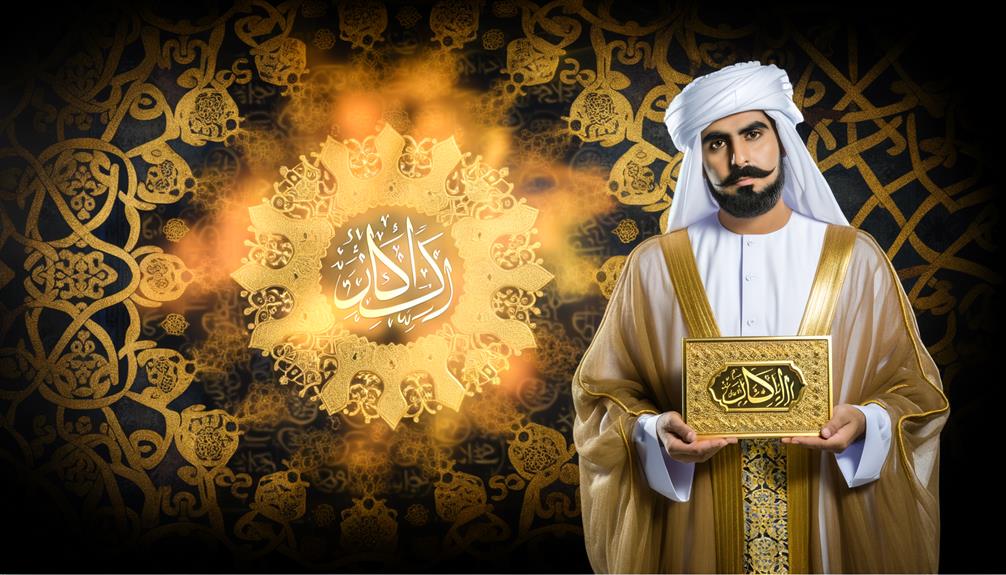Emir Name Meaning in Arabic
"Emir" is an Arabic name primarily used in Arab and Muslim communities worldwide. Rooted in the Arabic language, it means 'commander' or 'leader', so it's no surprise that this name symbolizes authority and leadership.
In pre-Islamic times, it was intended for individuals in various leadership roles. Even today, it's used to denote respect, influence, and success.
In the Arab world, the name Emir reflects power, strength, dignity, and cultural heritage. If you're intrigued to uncover more about the fascinating history and modern interpretations of the name Emir, keep exploring!

Key Takeaways
- The name Emir derives from the Arabic word 'amir' meaning 'commander' or 'prince'.
- It symbolizes authority, leadership, and respect in Arabic culture.
- The name Emir is used to denote leaders of tribes or military commanders.
- Its etymology is rooted in the Arabic language and traces back to pre-Islamic times.
- Emir holds a significant place in Islamic history and literature representing honor, nobility, and integrity.
Origins of the Name Emir
Exploring the origins of the name 'Emir', it's crucial to grasp that this strong, distinctive name originates from Arabic roots.
Emir, pronounced /e-mir/, isn't only popular in the Arab world, but it's also widely used in Muslim communities worldwide. The name traces back to pre-Islamic times and has been utilized to signify various leadership roles throughout history. You'll encounter it in historical records, embellishing the titles of royalty, military commanders, and governing officials.
It's also noteworthy to mention that 'Emir' wasn't exclusively reserved for the ruling elite. In certain contexts, it was employed to describe the leader of a group, even if that group was merely a small tribe.
In the following section, you'll explore the meaning and significance of this name.
Meaning and Significance in Arabic
Now, let's turn our attention to what 'Emir' actually means in Arabic and the weight it carries in this culture. Understanding the etymology of 'Emir' will give you an interesting insight into its layers of meaning.
We'll also explore the cultural impact of this name, to grasp its significance within Arabic society.
"Emir" Etymology Explained
Delving into the etymology of 'Emir,' you'll find its roots deeply embedded in the Arabic language, carrying a significant meaning of 'commander' or 'leader,' reflecting the importance of authority in the Arabic culture.
This term, originally spelled as 'Amir,' traces back to the Arabic verb 'amara,' which means 'to command.' It was typically used to denote a high-ranking military commander or a royal prince.
Over time, 'Emir' has evolved to represent a title of honor within the Islamic political and social hierarchy, often denoting a ruler or governor of a nation or state.
Cultural Impact of "Emir"
In Arabic cultures, the title 'Emir' carries an immense weight of cultural significance and respect, often symbolizing authority, leadership, and governance. It's not just a name, it's a reflection of the socio-political fabric of the region.
Emirs were, and in some places still are, the ruling heads of their territories, dictating law and order. Therefore, the title signifies not only power but also responsibility and duty, a guiding light for the people. Being an Emir means you're seen as a protector, a leader, and a figurehead.
In many ways, it's an indication of the community's trust and belief in you. Understanding this reveals the depth and richness of Arabic culture, where names aren't merely labels, but carry profound meaning and legacy.
Emir's Role in Arabic Culture
Understanding the role of an Emir in Arabic culture requires an exploration into the intricate tapestry of social norms, traditions, and hierarchies that define the Arab world. An Emir typically serves as a leader or commander with significant authority. This role often signifies respect and power, and it's deeply entrenched in the socio-political fabric of several Arab societies.
Here's a quick glance at the role of an Emir in Arabic culture:
| Emir Role | Description |
|---|---|
| Political Leader | Emirs often govern principalities or regions. |
| Military Commander | They frequently lead armies or strategic units. |
| Community Leader | Emirs may guide communities toward common goals. |
| Religious Figure | They may hold religious significance, embodying Islamic values. |
| Social Icon | Emirs often represent societal ideals and expectations. |
Famous Figures Named Emir
You're about to explore the world of famous figures named Emir, both historical and modern. This journey will offer a new perspective on their influence in society and highlight the significant role they've played.
Get ready to understand the profound impact of these luminaries, named Emir, on our global culture.
Emirs in Historical Context
Ever wondered about the historical figures who carried the name Emir? Well, let's delve into history and enlighten ourselves.
Emir Abdelkader, an Algerian religious and military leader, is one such figure who championed the resistance against French colonial invasion in the mid-19th century. His bravery, wisdom, and leadership made him a symbol of Algerian independence.
Another notable figure is Emir Faisal I, the King of Iraq during the early 20th century. His reign was marked by significant strides in modernization and political autonomy.
These historical figures named Emir not only left indelible marks on their societies, but also epitomized the qualities of leadership and courage inherent in the meaning of their name. Their stories continue to inspire people across generations.
Modern Figures Named Emir
While historical figures named Emir have left their mark, there are also many contemporary individuals bearing this name who've made significant contributions to society.
You might be aware of Emir Kusturica, a renowned Serbian filmmaker, whose work has garnered international acclaim.
Another notable figure is Emir Spahić, a Bosnian retired footballer, who represented his country in numerous international tournaments.
In the field of academia, Emir Sader, a Brazilian sociologist, is highly respected for his work on social and political issues.
And let's not forget Emir Preldzic, a Turkish professional basketball player, known for his skill and agility.
These modern figures named Emir continue the tradition of excellence associated with the name, each in their own unique way.
Emirs Influence in Society
Delving into the influence of Emirs in society, it's clear that numerous famous figures bearing this name have made substantial impacts in their respective fields. These individuals have not only elevated the prestige of the name 'Emir' but also contributed to societal advancement in various ways.
Take a look at the table below to get a snapshot of these influential figures:
| Name | Field | Contribution |
|---|---|---|
| Emir Kusturica | Filmmaking | Multiple award-winning director |
| Emir Spahic | Sports | Renowned soccer player |
| Emir Preldzic | Sports | Successful basketball player |
These Emirs have etched their names in the annals of history. Their achievements underscore the significance and influence of individuals named Emir in society. They not only inspire others but also symbolize the potential that lies within every 'Emir'.
Variations and Nicknames for Emir
You might be surprised by the numerous variations and nicknames that Emir has in different cultures and languages. This rich, historical name has been adapted in various forms to suit different tongues, while maintaining its regal essence. This flexibility makes it a popular choice across the globe.
Here are some variations and nicknames for Emir:
- *Amir*: This is a common variation in various Arabic-speaking regions.
- *Emiro*: This version is often used in Spanish-speaking countries.
- *Ameer*: This variation is popular in South Asian countries, including Pakistan and India.
- *Emi*: This is an affectionate nickname that's used across cultures.
Each of these variations reflect the influence of the local language and culture, while preserving the name's original nobility and strength.
Name Emir in Modern Contexts
In contemporary society, the name Emir continues to hold immense appeal, often chosen for its royal connotation and cultural significance. You'll find it prevalent among people of Middle Eastern descent, especially those with a keen sense of heritage and identity.
In today's globalized world, the name transcends linguistic barriers and cultural boundaries. It's a name that's both modern and traditional, a perfect blend of the old and new. Emir has a commanding presence, a name that carries weight, a name that demands respect.
Its historical roots offer a deep sense of connection to Arabic culture, while its modern usage reflects a global, multicultural world. So, if you're seeking a name with meaning, stature, and relevance, Emir could be an excellent choice.
Conclusion
The name Emir, a beacon of authority in Arabic culture, symbolizes leadership and power.
Emir, a moniker worn by many notable figures, continues to command respect in modern contexts.
Its various nicknames and variations add a layer of charm, further endearing it to many.
So, if you're thinking of naming someone Emir, you're bestowing on them a mantle of leadership and influence, wrapped in the rich tapestry of Arab heritage.






